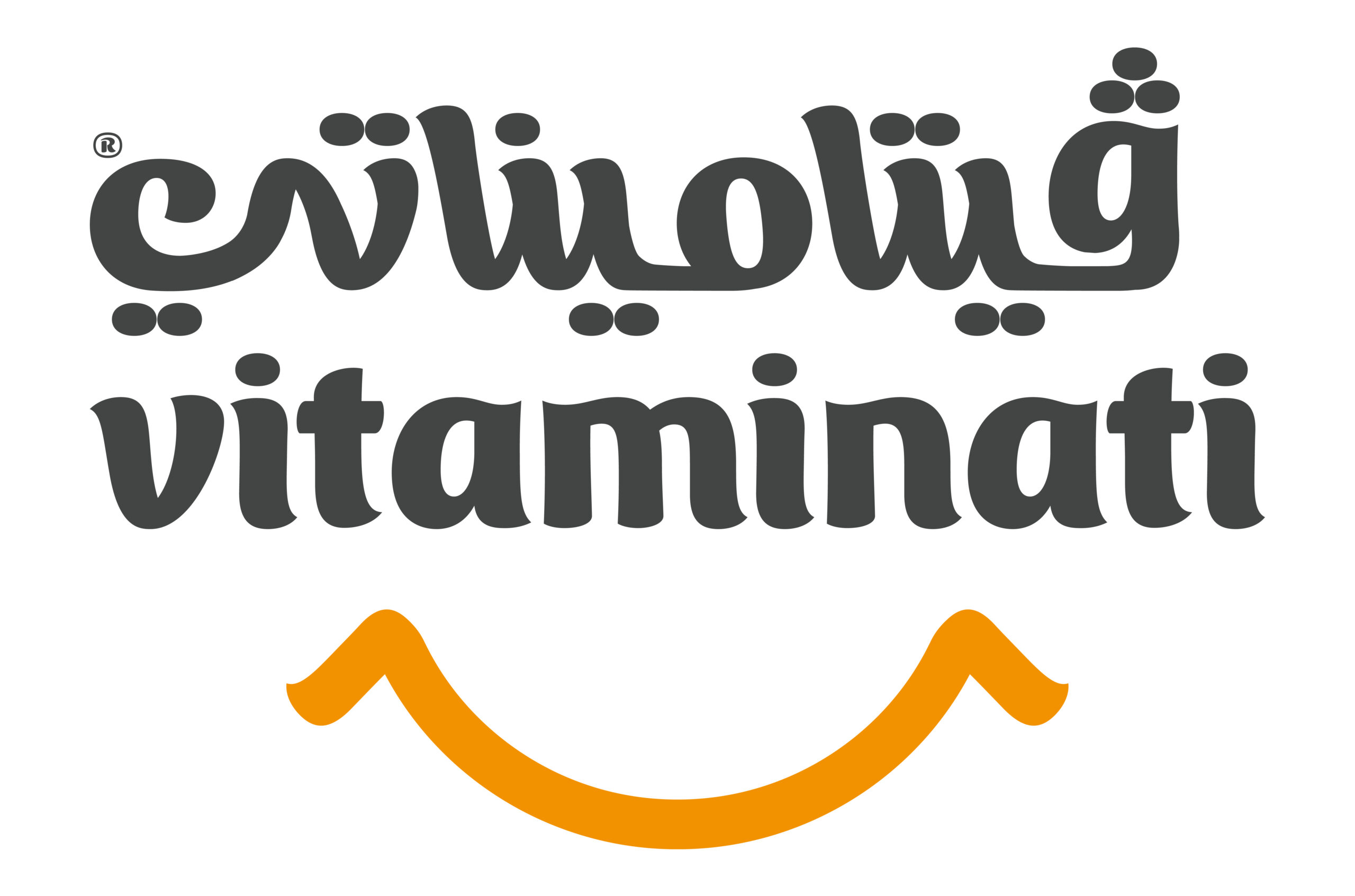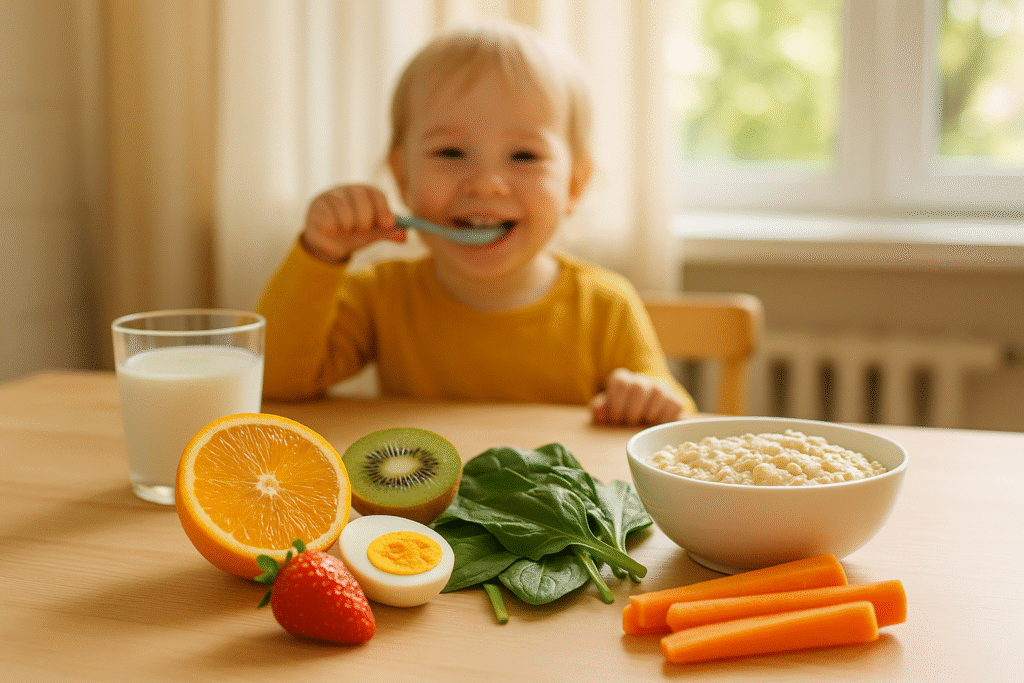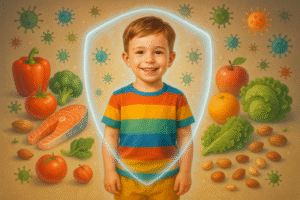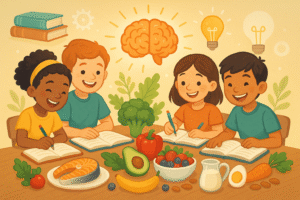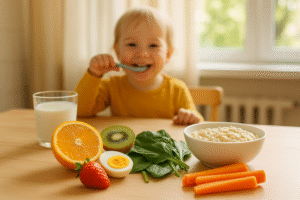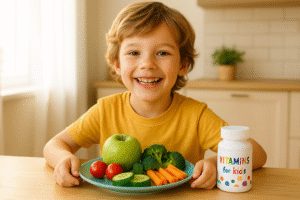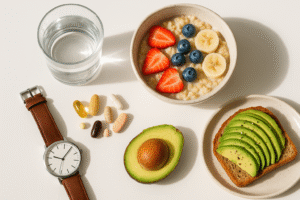Table of Contents
ToggleWhy 2-Year-Olds Need Special Vitamins?
Many parents ask about vitamins for 2-year-old children, why?
At the age of two, children enter a fascinating stage of rapid physical and mental development. Their bones grow stronger, muscles develop, and their brain activity expands as they learn new words, skills, and movements every day.
According to the World Health Organization (WHO), the first 1,000 days of life — from conception to age two — are critical for lifelong health. Any nutritional deficiencies during this period may affect immunity, brain development, or physical growth later in life.
The European Food Safety Authority (EFSA) and the American Academy of Pediatrics (AAP) emphasize that toddlers often don’t get all the nutrients they need from food alone, especially if they’re picky eaters. Monitoring vitamin intake and consulting a pediatrician when necessary helps ensure proper development.
The Best Vitamins for 2-Year-Old Children for Healthy Growth:
Your 2-year-old needs a range of vitamins and minerals that work together to support strong bones, a healthy immune system, and brain development.
| Vitamin / Mineral | Main Function | Recommended Daily Amount (RDA) |
|---|---|---|
| Vitamin D | Helps absorb calcium and build bones | 600 IU |
| Calcium | Strengthens bones and teeth | 700 mg |
| Vitamin C | Supports immunity and iron absorption | 15 mg |
| Iron | Builds red blood cells and brain development | 7 mg |
| Vitamin A | Maintains vision and skin health | 300 µg |
| Zinc | Boosts immunity and brain functions | 3 mg |
| Vitamin B Complex | Supports energy, appetite, and nerves | 0.5–0.9 mg |
Vitamins for 2-year-old children:
Vitamin D for 2-Year-Olds:
According to the ODS, vitamin D deficiency is one of the most common nutrient deficiencies worldwide. Lack of vitamin D can lead to soft bones or delayed walking (rickets).
EFSA recommends sunlight exposure (10–15 minutes per day) or a prescribed supplement if sunlight is limited.
Calcium for 2-Year-Olds:
Calcium is vital for bone and teeth development. WHO recommends two servings of dairy per day — milk, yogurt, or cheese — and leafy greens like broccoli as plant-based options.
Vitamin C for 2-Year-Olds:
Vitamin C is essential for collagen production, wound healing, and a strong immune system. It also improves iron absorption. Good sources include oranges, strawberries, kiwi, and tomatoes.
Iron Deficiency in 2-Year-Olds:
WHO reports that one in three children worldwide suffers from iron deficiency. It may cause pale skin, fatigue, or delayed mental development.
Provide iron-rich foods such as lean red meat, liver, lentils, spinach, and eggs, preferably with vitamin C-rich foods to enhance absorption.
Natural Sources of Vitamins for 2-Year-Olds:
The EFSA and AAP both agree that food should always be the first and safest source of nutrients.
| Vitamin | Natural Food Sources |
|---|---|
| Vitamin D | Egg yolk, salmon, fortified milk |
| Calcium | Cheese, yogurt, almonds, broccoli |
| Vitamin C | Citrus fruits, kiwi, red pepper |
| Iron | Meat, lentils, beans, whole grains |
| Vitamin A | Carrots, spinach, sweet potatoes |
| Zinc | Chicken, nuts, fortified cereals |
Related reading:
Do You Need Supplements If You Eat Healthy? The Food vs Vitamins Debate.
Vitaminati Tip:
Colorful plates are healthy plates! Offer your child foods of many colors — orange (carrots), green (spinach), yellow (eggs) — to ensure a natural mix of vitamins.
Do 2-Year-Olds Need Vitamin Supplements?
Not all children need supplements — but some do.
AAP and WHO recommend supplements only when the child:
-
Eats selectively (avoids fruits, veggies, or proteins)
-
Has dairy intolerance or food allergies
-
Gets little sunlight exposure
-
Shows poor appetite or frequent illness
In such cases, your pediatrician might suggest a multivitamin like VitaCed Multikids to fill nutritional gaps.
Read more: VitaCed Multikids: Boosts Immunity, Strength, and Energy for Kids.
Always follow a doctor’s advice — excessive intake of vitamins (especially A or D) can be harmful.
Recommended Daily Allowances (RDA) for 2-Year-Old Children:
| Nutrient | Recommended Intake | Safe Upper Limit |
|---|---|---|
| Vitamin D | 600 IU | 1000 IU |
| Calcium | 700 mg | 2500 mg |
| Iron | 7 mg | 40 mg |
| Vitamin C | 15 mg | 400 mg |
| Vitamin A | 300 µg | 600 µg |
| Zinc | 3 mg | 7 mg |
How to Read Vitamin Nutrition Labels: A Simple Guide to Choosing Safe Supplements.
Source: EFSA and ODS Dietary Guidelines
Signs of Vitamin Deficiency in 2-Year-Olds:
According to WHO and AAP, the following symptoms may indicate vitamin deficiency:
| Deficiency | Common Symptoms |
|---|---|
| Vitamin D | Bone weakness, delayed walking |
| Iron | Pale skin, fatigue, poor appetite |
| Vitamin C | Gum bleeding, slow wound healing |
| Vitamin A | Night blindness, dry skin |
| Calcium | Muscle cramps, weak teeth |
Vitaminati Advice:
If you notice these symptoms, don’t self-prescribe supplements — consult a pediatrician for accurate diagnosis and treatment.
Signs of Vitamin Deficiency in adults.
Practical Meal Ideas for 2-Year-Olds:
Here’s a simple daily meal plan that meets EFSA’s vitamin guidelines:
| Meal | Example | Nutrients Covered |
|---|---|---|
| Breakfast | Oatmeal with milk and banana | Calcium, vitamin D, potassium |
| Lunch | Rice, chicken, and cooked vegetables | Protein, iron, vitamin A |
| Snack | Yogurt with fruit | Calcium, vitamin C |
| Dinner | Lentil soup with whole-grain toast | Iron, fiber |
Pro Tip: Encourage your child to eat with you — toddlers copy their parents’ habits!
Conclusion: Balanced Nutrition Is the Foundation.
At the end of the day, the best vitamins for 2-year-old children are those that come from real, diverse foods. Supplements can help, but they should never replace a balanced diet.
Your child’s daily essentials are simple:
Sunlight for vitamin D
Milk for calcium
Fruits and vegetables for vitamins A and C
Proteins for iron and zinc
Together, they create the healthiest formula for strong growth and lasting immunity.
Frequently Asked Questions (FAQ)
1. What are the best vitamins for 2-year-old children?
Vitamin D and iron are essential, along with calcium, vitamin C, and vitamin A for growth and immunity.
2. Do toddlers need daily supplements?
Not always. It depends on their diet. Consult your pediatrician before giving any supplement.
3. What are the symptoms of iron deficiency?
Pale skin, fatigue, irritability, and slow growth.
4. Can sunlight provide enough vitamin D?
Yes — about 10–15 minutes of sun exposure per day is usually enough for toddlers.
5. Are natural vitamins better than synthetic ones?
Whole foods are always best, but supplements are useful when medically necessary.
6. How can I encourage my child to eat healthier?
Offer small, colorful meals, avoid force-feeding, and make eating a fun family activity.
Vitaminati Takeaway:
Start in the kitchen, not at the pharmacy. Balanced meals, outdoor play, and sleep are the real foundation of your child’s health and growth.
PharmD with expertise in pharmaceuticals and a passion for making medical knowledge clear, accurate and accessible to all
